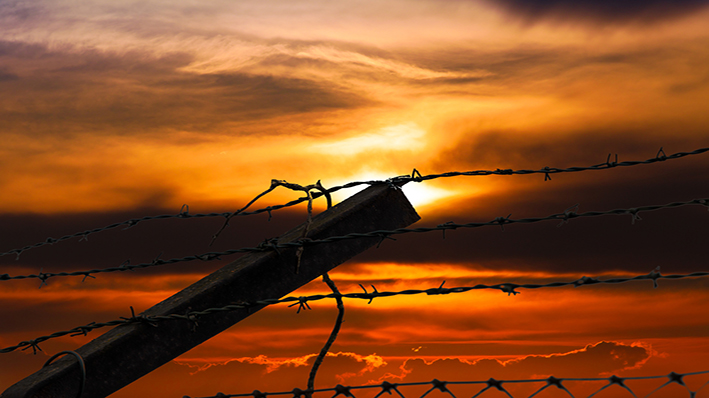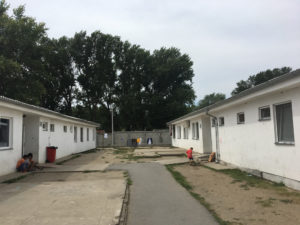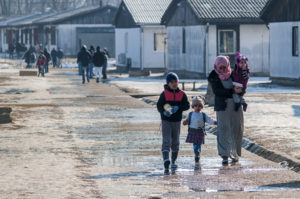
EwaStudio/Shutterstock.com
“Dia is my name”, she began, “it means eyes in Kurdish”.
If you have tried keeping up with international headlines at any point within the last five years, you may have seen a picture of a refugee camp taken in Turkey, for example. Or, in my case, you may have happened to walk through a wide open, yet hidden, dirt-covered refugee camp in the middle of Belgrade, Serbia.
During the summer of 2017 that was where I found myself and I could have sworn it was as if I had another set of eyes after meeting Dia in that camp on that hot day.
A CRISIS TODAY
The history of our modern refugee crisis, as is experienced firsthand by minority citizens of Iraq, cannot be explained without an understanding of each and every migrant’s story. This was why Dia’s story mattered to me: not because I was looking for a story to tell, a person to call a friend, or a way to spend my time.
Dia’s story held her identity above everything happening in the comparatively larger world around the both of us. My history with Dia has lasted only two years but the history behind her and behind her identity as a Kurdish girl began long before these two years, and even long before her birth.
KURDISH PAST
Kurdish people were first denied a nation-state in the early 20th century by countries including Iraq. Consequently, they have also become minorities in these countries.
When the Islamic State began fighting for nearby territory, so did Kurds. Although they were denied a state, Kurds in Iraq had regional autonomy which allowed for them to build military opposition (Peshmerga) against the Islamic State.
EXISTING THREATS
Today there’s even more to it. The imminent danger of ISIS reorganization and existing American interference in Iraq as well as an upcoming presidential election in the United States…
Changes to immigration policies were made and can be made daily, as immigration patterns remain more or less the same. That was the case even more so in 2019 than in 2017, when I met Dia.
Just last fiscal year, the United States had limited the number of resettled Iraqi refugees to 4,000. Yet, since 2018, their numbers have been much lower and it is not due only to decreasing immigration to the States, it is tied directly to the bottlenecking of accepted visa applications on behalf of migrants.
In September of 2019, the new limitation on applying migrants had been changed from 30,000 to 18,000 individuals. This change has been enacted and applies to the United States’ current fiscal year.
While a new calendar year has begun, so have new discussions concerning the future of this country (Iraq) and its displaced citizens.
THE IDENTITY
My reason for being with Dia was tied to my own identity, which also carries cultural and historical significance relevant to unlawful displacement of innocent victims of war. I was born half Serbian and consider myself to be Serbian, in terms of religious and cultural orientation.
As both a separate nation and a constituent republic of a larger state, Serbia has witnessed the displacement of their own “people” as well as individuals belonging to other religious, cultural, or ethnic groups. I knew for a fact before seeing the refugee camp that such mass displacement could be sourced to a certain period in history and to political decisions made by figures of authority who were often lacking the experiences of the displaced “other”.
I knew, as anyone with me on that hot summer’s day would know, that Dia was of similar age and potential as myself. That was except for the fact that she had experiences throughout which she suffered more than I ever had throughout my time as a youth.

M.O. Brucker
TOMORROW
Today, it is more important than it ever was for voters to understand the complex consequences of individuals deeply affected by war fought by state and non-state actors.
In December of 2019, an Iraqi Kurdish officer analyzed Islamic State as a growing regional threat in the country with growing access to money, transportation, weapons, not to mention military influence.
Refugees and their families, especially one to which Dia belonged, are increasingly at risk of becoming victims of war.
In the United States, different political candidates address such international crises with varying solutions. Candidate Bernie Sanders, for example, promotes the decriminalization of illegal immigrants while Joe Biden does not.
Such policy proposals, when they belong to the Executive, reflect directly onto citizens from conflict zones. Moreover, the United States still maintains thousands of troops in Iraq from the American-led invasion in 2014 to fight Islamic State in that country, including part of Kurdistan.

Leaving Camp ZSinobad/Shutterstock.com
Iraqi politicians have responded, without the support of Kurdish minorities, to recent clashes between the United States and both Iran and the Iranian-supported Popular Mobilization Units within Iraq and the assassination of a powerful Iraqi military general (along with Iranian General Qasem Soleimani) American air strikes.
This response was provoked by the United States publicly announcing its shift of priorities from fighting Islamic State to protecting its own troops and halting the training of Iraqi militants.
Prime Minister Adil Abdul-Mahdi along with the majority of Iraqi parliamentarians have backed a resolution directing the government to request all foreign forces including the U.S. to leave Iraq. The request also included those there to combat IS forces.
Iraq and the United States have thus committed to legislation and/or redeployment of forces without equally considering the effects on Sunni minorities and Kurdish citizens who might be left without any opportunities for legal immigration or resettlement.
A STEP BEYOND
Despite international treaties asserting Dia’s right to legal immigration and to schooling, she has been denied both. In the interest of the United States and Iraq, and their citizens, the identities of individuals and the rule of law must be maintained wherever possible.
In Dia’s case, and thus today, insufficient change has been implemented for the sake of protecting civilians. What could this mean for tomorrow? Clearly, Dia will depend on the support of members of our generation and hers for her future.
About the Article
A view from a Serbian camp for Middle Eastern refugees.



